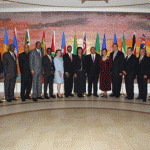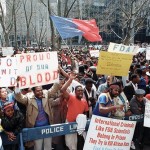BAGHDAD — Four bombs ripped through Shi’ite neighborhoods in Baghdad yesterday evening, killing at least 40 people in the worst violence the capital has seen in months, Iraqi officials said. An American civilian aid specialist working to improve education in Iraq was killed in a separate attack
The violence underscored the fragile nature of the security gains in Iraq at a time when American forces are preparing to withdraw by the end of this year. It also highlighted the challenges facing the State Department personnel and American contractors who would stay on after the US military is gone.
The first three bombs went off in quick succession in a southwestern Baghdad neighborhood shortly after 7 p.m. One targeted a Shi’ite mosque, another exploded just outside a popular market, while the third went off inside the market where people were doing evening shopping ahead of the Muslim weekend, Iraqi police officials said.
The officials said 34 people died and 82 others were injured in the three blasts. An official from Baghdad’s Yarmouk hospital confirmed the casualty figures.
An Iraqi resident, Jabir Ali, said he was about 200 yards away when one of the bombs went off near a barber shop where his cousin works.
“I saw many people killed and injured. I went to see my cousin. The glass at his shop was broken, and he was injured in his head, chest, and hand by the glass,’’ said Ali, who drove his cousin to the hospital.
About an hour later, a parked car bomb targeting a police patrol killed six people, including one policeman and five bystanders in a different neighborhood in southwestern Baghdad, said hospital officials.
The officials all spoke on condition of anonymity because they were not authorized to speak to reporters.
There was no immediate claim of responsibility, but Sunni extremists such as Al Qaeda in Iraq generally tend to target Shi’ite mosques and neighborhoods and Iraqi security forces.
It was the worst attack in the capital since a parked car bomb exploded near a mourning tent in a northern Baghdad neighborhood in January, killing 48 people.
The American civilian, who was killed earlier yesterday, was Dr. Stephen Everhart, said Victoria Nuland, a US State Department spokeswoman.
“Dr. Everhart was an American citizen who was working in Iraq for an implementing partner of the United States Agency for International Development’s Mission in Iraq. He was killed while working on a project to introduce a new business curriculum to a Baghdad university in a program supported by the Iraqi Ministry of Higher Education,’’ she said in a statement.
“We are saddened by this tragedy and extend our thoughts and prayers to Dr. Everhart’s family and loved ones, and to the three other injured victims and their families.’’
Everhart worked at the American University in Cairo, where he was associate dean of the Business School and a finance professor. Before joining AUC, he worked extensively with the World Bank and the Overseas Private Investment Corporation, a US government agency designed to help businesses break into developing markets.
He also wrote articles on topics like international aid, corruption, and financial markets.
Officials at Georgia State University said Everhart listed San Antonio as his hometown on his registration paperwork. Everhart got both his master’s and doctorate in economics at Georgia State in Atlanta.
Mary Beth Walker, dean of the School of Policy Studies, saidEverhart had contact with Georgia State faculty members in the last two weeks about his work in Iraq and said he was planning to move to Vietnam soon to work at a university there.
An Iraqi police official said American contractors were visiting a satellite office of Mustansiriyah University in eastern Baghdad when they were hit by a roadside bomb.![]()
 Nassau (Bahamas): le gouvernement dominicain viole le droit international, déclarent les leaders de la Caricom
Nassau (Bahamas): le gouvernement dominicain viole le droit international, déclarent les leaders de la Caricom A court ruling to deny citizenship to Haitian Born in Dominican Rep.
A court ruling to deny citizenship to Haitian Born in Dominican Rep. Cruise Company Blames Captain .
Cruise Company Blames Captain .
Leave a Reply